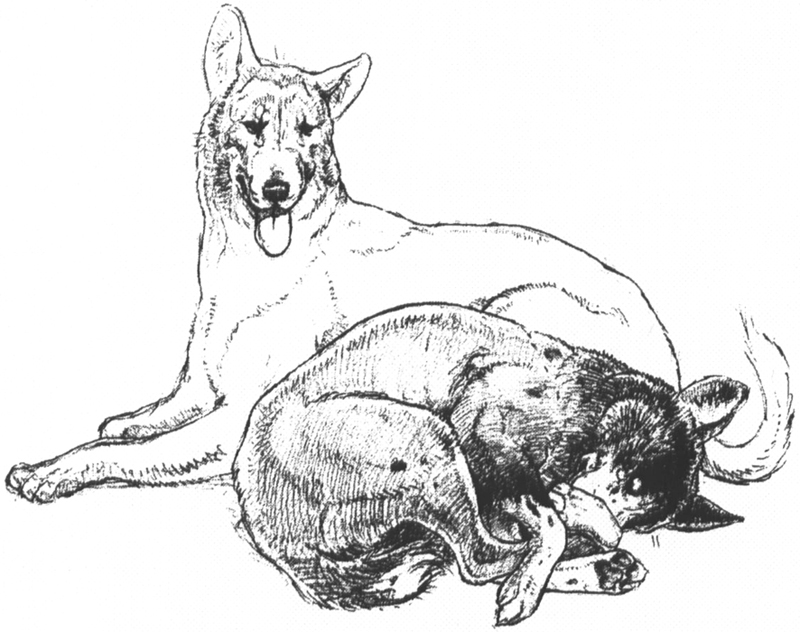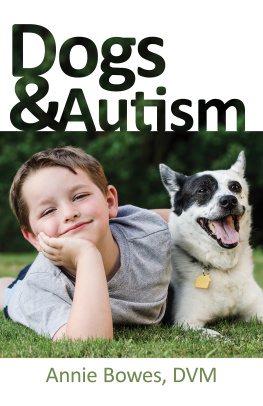The Social Lives of Dogs
The Grace of Canine Company
Elizabeth Marshall Thomas

This book is dedicated to those who participated
in our mixed-species household:
Sundog, Misty, Pearl, Ruby, Sheilah, Suessi, Fatima,
Inookshook, Bean, Wicket, Hobbs, Betty, and Little Sheilah
also
Lilac, Rajah, Wicca, Pae, Phyllis, Pula, Christmas,
Jeoffrey, Machka, Kochka, Carol, and Devi,
also
Lorna II, Pilgrim, Viva, Carmen, and Rima,
also
Steve, Lorna M, Stephanie, Ramsay, Bob, Sy, Howard,
Vladimir, Peter, Ele, David, Zo, Ariel, Margaret,
Anna, Becky, Carol, Jan, Susan, and Don.
Introduction
When I was very young, my nanny was a big Newfoundland dog named Mishka, whose task was to keep me from drowning. In those days, our family took vacations on Cape Cod, and Mishka, who, like many other dogs, knew all about the command Sit and Stay, always made me do exactly that, far back on the beach. I thus spent many summer days feeling hot, dry, and frustrated as I watched other people happily swimming, because mean old Mishka, who was vastly more strict than the grown-ups of the family, wouldnt even let me go down to the wet sand to make a sand castle.
Ever since then, Ive been puzzled by the notion that dogs accept us as pack leaders. I was certainly not Mishkas pack leader. She was servile enough around the adults, always bowing her head and waving her tail agreeably, but her nose and mine were of equal height if I stood up, and I can still remember the flinty look in her stern, brown eyes if I even thought about swimming. I have also been puzzled by the importance that seems to be placed on human speech. Mishka never said a word, yet she made herself perfectly clear. As a result, I learned many things from her. To be sure, I had to learn to swim from somebody else, but from her I learned how interesting and subtle someone of another species can be.

Half a century later, at the time of this writing, my husband and I still live in a mixed-species household, which we and other people share with dogs, cats, and parrots, a household that sometimes seems like a large cauldron of soup in which a mysterious force keeps churning things to the surface, always in different configurations. The many intertwined relationships often involve us, the people, but are by no means always determined by us. Sometimes we seem to be the controlling factor, and sometimes we seem to be pawns. Over the past fifteen years I have tried to look closely at the activity that was quietly going on around me, often with methods that some might find controversial. These methods were taught to me in my childhood, by Mishka, my beloved Newfoundland nanny.
Can we understand the mind of an animal? The question is hot indeed. Some say that animals have consciousness, while others vehemently insist that they dont. The rationale for this negative view escapes me since most of the research on the subject by such esteemed scientists as Marc Bekoff, Dian Fossey, Roger Fouts, Jane Goodall, Donald Griffin, Irene Pepperberg, Sue Savage-Rumbaugh, and Frans de Waal (to name a few) would certainly support the position that animals have many mental qualities similar to our own, a position which, incidentally, was shared by Charles Darwin. Observations made by other scientists such as Douglas Chadwick and George Schaller, who do not address the question of animal consciousness as such, nevertheless suggest that animals display awareness and emotion.
Some scientists, however, believe differently. Their negative view seems to spring more from theory than from field experience. Even so, the view that animals are incapable of conscious thought, or even of emotion, has acquired an aura of scientific correctness, and at the moment is the prevailing dogma, as if some very compelling evidence to the contrary was not a problem.
The negative view is bolstered by the concept that the minds of all other animals are so different from ours that we couldnt decode their mental products anyway. If a lion could talk, we wouldnt understand him, said Ludwig Wittgenstein, voicing a sentiment that today is echoed by those who seem perfectly content to take as their guide to the animal kingdom not a biologist but a philosopher whose own mental products can only be described as murky. Following the thoughts of a lion might be as hard for all but lion specialists as following Wittgenstein is for all but Wittgenstein specialists, says my friend Peter Schweitzer, an expert in encryption.
Wittgensteins adherents could just as easily have turned to John Donne, much more progressive, who in 1610 wrote: Man is a lump, where all beasts kneaded be. Wisdom makes him an Ark, where all agree. Donnes words have been forgotten by all but the English professors, but Wittgensteins sentiment continues to be echoed by those wishing to demonstrate the vast (as they see it) differences between animals and people. Well, of course were different. Just as our bodies are different, our minds are surely different too. Every species is different from every other species, each one being the solution to a different set of problems posed by its environment, each the best solution that Gaia has found up to now. Id be the first to agree that if a lion could talk, we might very well not follow his reasoning on certain subjects.
For example: When doing fieldwork with wild animals in Namibia, I once watched a lion watch a sunset. He was alone on open ground near a waterhole, crouched but relaxed, propped on his elbows, and from the time the sun was about five degrees above the horizon until the last red bit of it went down, he didnt take his eyes off the spectacle. At the very last minute, he roared at it, or anyway, he roared while looking at it, not just once but four or five times, very loudly.
What did he make of what he saw? Why, on that particular evening, would he watch this familiar drama? And why did he roar? I would have loved to hear his explanationassuming that his mind was on the sunset, as his eyes wereand I wouldnt mind a bit if I didnt understand what he said. If lions could talk, I and thousands of other people who long to know more about animals would be very happy indeed to hear what they had to say about almost anything. Never mind that Ludwig fellow, wed tell them. Nobody understands him either. Try us anyway.
Furthermore, I believe that Wittgensteins followers are wrong to say wed understand nothing. Perhaps we wouldnt understand about the sun, but Im sure that some of us would have no problem with a lions views on a subject such as hunting. During the 1950s it was my very great privilege to live in the Kalahari Desert among the Ju/wa Bushmen, who in those days lived solely by hunting and gathering, without domestic plants, domestic animals, fabric, or any manufactured goods. Their material resources, in other words, were the same as those of many of the creatures with whom they shared the savannah. Not surprisingly, the hunting habits of the Bushmen were similar to those of lions. The concepts seemed similar too.
Unlike Wittgenstein and his naysaying followers, who get their food from the refrigerator, neither the lions nor the Bushmen stored foodboth had to hunt for it when they wanted it. Both groups needed proportionately the same amount of nourishment, both groups hunted the same kinds of prey, both groups hunted more by stealth and stalking than by chasing, and both hunted mainly by sight, making much less use of scent and sound than do many animals. Also, the behavior of the quarry was the same, the approach to the quarry was very much the same, the striking distance was almost exactly the same, and the silent expressions of restrained pleasure when the quarry was down seemed almost identical. To be sure, the Bushmen hunted only by day while the lions hunted at any time, but lions can see by starlight, so the difference was not significant.














